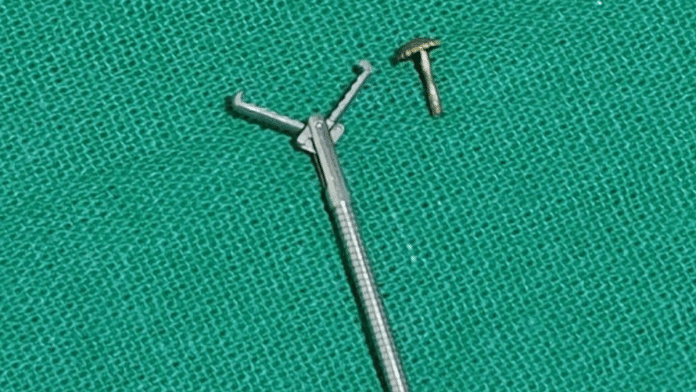New Delhi: A team of doctors in Kolkata has successfully removed the sharp screw of a gold nose pin from a woman’s right lung without invasive surgery.
The screw, which was accidentally “inhaled” by the 30-year-old, sat in her lung in a very atypical position, doctors said.
The use of the thin, flexible bronchoscope was ruled out to extract the object since it was sharp – since even a small mistake or omission could pose a threat to the patient.
Against heavy odds, the doctors chose the conventional, rigid bronchoscope which is a hollow metal tube, to inspect the lower airway. The team, led by Dr Debraj Jash of the Medica Superspecialty Hospital, used this method to retrieve the object in a procedure that lasted 20 minutes.
The hospital said such complicated cases usually necessitate invasive surgery involving the removal of a portion of the lung to prevent potential complications. However, Jash, the hospital’s director of respiratory medicine, opted for conventional bronchoscopy.
The woman in her mid-thirties “inhaled” the nose pin screw around three months ago. Over the weeks, she developed a severe cough and found it difficult to breathe.
A subsequent X-ray found the screw in her right lung but doctors, who initially treated her, could not remove it via conventional bronchoscopy. As her condition deteriorated, she was referred to Jash in March. This was the first time he came across a case in which such a sharp object was lodged in the lung for many months.
“People have had an areca nut, chickpea or a pen cap stuck in their throat, but in this surgery, we had to remove a sharp thing which was in a critical position,” he said.
“If the patient had ignored it for a few more days or the surgery had not been done at the right time, her condition could have worsened. The risk of lung infection and pneumonia could increase,” he told ThePrint.
The patient, a homemaker, recovered and was discharged from the hospital four days after the operation.
(Edited by Tikli Basu)
Also read: India second highest in hepatitis B & C after China, says WHO report






